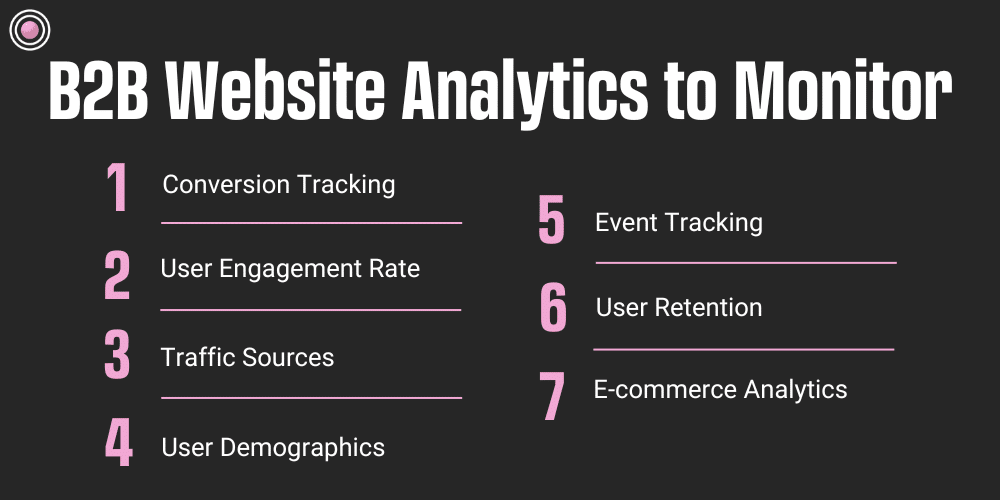
-
Joshua Lee
- 3 Min Read
- Blog, Tracking and Analytics, Website
Key B2B Website Analytics Metrics to Monitor in GA4
In the dynamic realm of B2B marketing, understanding and leveraging website analytics is crucial for staying ahead of the competition.
Google Analytics 4 (GA4) is a powerful tool for dissecting user behaviour, evaluating website performance, and fine-tuning marketing strategies.
To unlock the full potential of GA4 for B2B ventures, it’s imperative to focus on specific metrics that align with your business objectives. Let’s delve deeper into each key metric:
Conversion Tracking
For online B2B companies, conversion metrics are the ultimate measure of success. Conversions may take various forms, including lead generation, form submissions, or product purchases. GA4 facilitates comprehensive conversion tracking by allowing you to set up specific events that align with your business goals.
This could include tracking form submissions, resource downloads, or other actions indicative of a user moving along the sales funnel. By analysing these conversion events, you gain valuable insights into user behaviour and can optimise your website to enhance the overall conversion rate optimisation.
User Engagement Rate
Engaged users are more likely to convert into valuable leads or customers. GA4 provides metrics such as average session duration, pages per session, and bounce rate to gauge user engagement.
A longer average time spent on a web page and a lower average bounce rate typically indicate that users find engaging and relevant content on your website. Monitoring these essential metrics over time enables you to identify high-performing content and areas for improvement in user experience.
Traffic Sources
Understanding where your website traffic originates is pivotal for refining your marketing strategies.
Google Analytics 4 categorises traffic into various sources: organic search, direct, referral, and social. Analysing these sources helps you identify the channels that drive the most valuable traffic to your B2B site.
This information is invaluable for optimising your SEO marketing efforts, refining social media marketing campaigns, and focusing resources on channels that yield the best results and increase organic traffic.
If you’re looking to enhance your SEO strategy using website analytics, see our recent blog ‘Website SEO Analytics – What Matters?’.
User Demographics
Tailoring your B2B marketing approach requires a deep understanding of your audience. Google Analytics 4 provides demographic information such as age, gender, and location of your website visitors.
Armed with this data, you can create targeted content and campaigns that resonate with your ideal customers to create a positive user experience on your website. Whether you’re adapting your messaging or refining your advertising strategies, knowing your audience is fundamental to success.
Event Tracking
In a B2B context, user interactions beyond pageviews often indicate engagement more. GA4’s event tracking feature allows you to monitor specific interactions, such as downloading resources, watching product demos, or engaging with specific elements on your site.
By tracking these events, you gain a nuanced understanding of how users interact with your B2B website, helping you optimise the user experience and tailor content to meet their needs.
User Retention
For B2B businesses, customer retention is a critical metric. Google Analytics 4 provides user retention reports, offering valuable insights into how often users return to your site over a specified period.
Analysing user retention patterns helps you refine your content strategy and engagement tactics to encourage repeat visits. Building long-term relationships with your audience is essential for B2B success, and understanding user retention is a key component of that strategy.
E-commerce Analytics
If your B2B website involves e-commerce transactions, Google Analytics 4’s enhanced e-commerce tracking is indispensable.
Monitor metrics such as transaction revenue, average order value, and conversion rate to gain valuable insights into your online sales performance. This information is invaluable for optimising your product offerings, pricing strategy, and overall e-commerce user experience.
Whether you’re selling software subscriptions or physical products, understanding e-commerce analytics is crucial for driving revenue and improving customer satisfaction.
In summary, regularly monitoring these key B2B website analytics metrics in Google Analytics 4 provides a comprehensive view of your online performance.
By interpreting these metrics and making data-driven, informed decisions, you can optimise user experience, enhance engagement, drive conversions, and ultimately achieve your business objectives in the competitive B2B landscape. Keep in mind that the digital landscape evolves, so a proactive approach to analytics is essential for continued success.
Don’t let valuable data go to waste.
Contact ROAR and discover how our Website Tracking and Analytics Services can help you uncover hidden opportunities and drive growth for your business.






